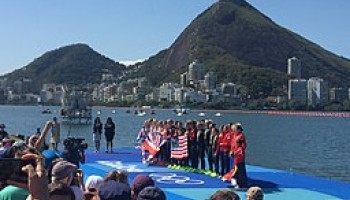The testimony comes nearly two years after Brazilian prosecutors first charged the head of the Brazil Olympic Committee, Carlos Nuzman, for bribery related to the 2016 Games. Nuzman repeatedly denied claims that he was involved in a bribery scheme, and his lawyer reemphasized his innocence on Thursday.
It also comes nearly four years after the launch of a French money laundering and corruption investigation into former president of the International Athletics Federation (IAAF) and former member of the International Olympic Committee, Lamine Diack, who has also continually maintained his innocence.
However, Cabral, who was handed a 197-year prison sentence in 2018 for a separate series of corruption charges, directly implicated both men in his detailed testimony on Thursday.
“Nuzman came to me and said, 'Sergio, I want tell you about the president of the International Athletics Federation, IAAF, Lamine Diack, he’s someone who is open to taking bribes,'” Cabral said.
Cabral added that he was assured by Nuzman that the scheme would “work” because Diack was known to have sold votes in the past. The deal they allegedly ultimately struck was a payment of US$1.5 million for a guaranteed 6 votes (of roughly 100 total), with Diack later requesting an additional $500,000.
Voting for the location of the 2016 games took place in 2009. Rio de Janeiro competed with Madrid, Tokyo, and Chicago, with the latter being tipped as the “favorite” because of its connection with the then-recently elected President Barack Obama.
However, Chicago was eliminated in the first round of voting, Tokyo in the second, and Madrid in the third, leaving Rio de Janeiro as the victor. Following the announcement of the results, the governor of Tokyo, Shintaro Ishihara, made note of the behind-the-scenes dealings that had prevented Tokyo from winning.
“Invisible dynamics were at play,” he said to reporters at the time. “It is a game that is very difficult to win.”
At his Thursday testimony, Cabral also implicated Rio de Janeiro’s former mayor Eduardo Paes, and Brazil’s former, currently imprisoned president, Luiz Inácio Lula da Silva, who were both allegedly aware of the scheme, though they were not directly involved.
He also specifically named several former top athletes and International Olympic Committee members, including former Russian swimming champion Alexander Popov and Ukrainian pole-vaulter Sergey Bubka, as two of those who accepted bribes in exchange for their votes.
On Friday, both Bubka and Popov denied the allegations and announced they would be pursuing defamation suits against Cabral.
The International Olympic Committee released a statement on Friday saying it is following up on Cabral’s allegations.






